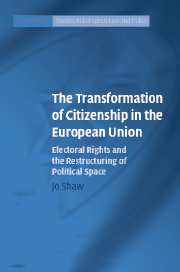 The Transformation of Citizenship in the European Union
The Transformation of Citizenship in the European Union Book contents
- Frontmatter
- Dedication
- Contents
- List of figures
- List of tables
- Preface and acknowledgments
- PART I Electoral rights in legal and political context
- PART II The past, present and future of EU electoral rights
- 4 The emerging constitutional framework for electoral rights in the era of European citizenship
- 5 EU electoral rights since 1993
- 6 Electoral rights for Union citizens: looking to the future
- 7 Electoral rights for third country nationals: what role for the European Union?
- PART III The contestation of electoral rights in the Member States of the European Union
- PART IV Conclusions
- Bibliography
- Index
6 - Electoral rights for Union citizens: looking to the future
from PART II - The past, present and future of EU electoral rights
Published online by Cambridge University Press: 05 June 2015
- Frontmatter
- Dedication
- Contents
- List of figures
- List of tables
- Preface and acknowledgments
- PART I Electoral rights in legal and political context
- PART II The past, present and future of EU electoral rights
- 4 The emerging constitutional framework for electoral rights in the era of European citizenship
- 5 EU electoral rights since 1993
- 6 Electoral rights for Union citizens: looking to the future
- 7 Electoral rights for third country nationals: what role for the European Union?
- PART III The contestation of electoral rights in the Member States of the European Union
- PART IV Conclusions
- Bibliography
- Index
Summary
Introduction
This is the first of two chapters which explore the developmental potential of the existing EU electoral rights. The chapters cover the material scope of the rights (what elections are covered, what is the nature of the rights available and under what conditions can they be exercised?) and the personal scope (who has the electoral rights?). The discussion is set against the backdrop provided by the political conditions affecting citizenship issues at the national and European levels in the mid- 2000s, and specifically the question of electoral rights. As the earlier chapters have shown, the original preoccupations within the debate about electoral rights with the democratisation of the Union's institutions and the special rights of nationals of the Member States are still relevant considerations. It is intriguing to note that the EU in the mid- 2000s has been in the grip of a crisis of identity about its role and purpose in the modern world, and about what relationship there should be between citizens and residents and the Union institutions, which has been as intense as any in its history. There was a clear manifestation of this crisis in the debate about the future of the Union in the light of the rejection of the Constitutional Treaty in referendums in France and the Netherlands, but this crisis of identity affects not only the possible future development of the founding treaties, but also the ongoing work of the Union and its institutions.
It is important to be sanguine about the achievements of the European Union thus far in relation to citizenship issues. Even the most basic goals of free movement under the EC Treaty appear not to have been entirely achieved. Why else would 2006 have been declared European Year of Workers’ Mobility? And why else would the realisation of employment mobility be made central to the goal of boosting productivity and growth under the Lisbon Agenda? Not all of this desired mobility is necessarilytransnational mobility, but coincidentally 2006 also marked the date by which Directive 2004/38/EC, adopted by the Council and the European Parliament to facilitate the right of citizens of the EU and members of their families to move and reside freely within the territory of the Member States, should have been duly implemented by the Member States.
- Type
- Chapter
- Information
- The Transformation of Citizenship in the European UnionElectoral Rights and the Restructuring of Political Space, pp. 168 - 208Publisher: Cambridge University PressPrint publication year: 2007


